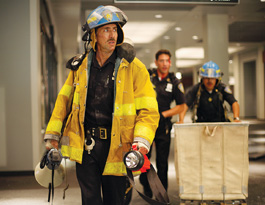home | metro silicon valley index | movies | current reviews | film review

Heroes Are Made, Not Born: Nicolas Cage steps up on Sept. 11.
Towers of Stone
Nicolas Cage struggles to survive the good intentions of Oliver Stone's 'World Trade Center'
By Richard von Busack
IN THE MIDST of World War II, the noted film critic James Agee described his conflicted feelings about watching a badly made documentary about Stalingrad: "It's like being moved by words like love, death, blood, sweat, tears, regardless of how well or ill they're used." That's the same problem with watching a film named after the World Trade Center. At the time, we wondered if there would ever be a film version of such a calamity, and whether such a movie could be anything other than a manipulative disgrace.
In World Trade Center, director Oliver Stone tries to return us to the moment before so much blood went down the gutter. That he does well. His morning cityscapes reveal the unseasonable heat and clarity of the day. A squad of Port Authority cops prepare for a day of seeking teenage runaways and shooing transients from the base of the statue of Ralph Kramden outside the bus station.
Later, Stone depicts the jet strikes as something happening elsewhere: a shadow flickers on a building, not noticed by people on the midtown streets. Hearing reports of what he thinks is an ordinary aviation disaster, PAPD Sgt. John McLoughlin (Nicolas Cage) commandeers a bus.
The surest scenes occur after the police arrive. Unlike many of our more martial filmmakers, Stone was actually in a war, and so he's very convincing about interpreting the World Trade Center disaster as a battlefield, with the police as fresh soldiers arriving on the scene. Stone is painfully good with the moments as the police hurry up and wait. He takes the tempo slower as ashy, gore-streamed firefighters emerge from the stairwells, past ruined mall shops. Then come the shock cases in torn-up business suits, half-blind, leading each other with their hands on their shoulders. It is a terrible emergency, but everything goes slow. Stone pauses on the agony of the moment right before the action begins, right before the order is given: "Don't think. Keep moving."
And then we see the indoor tornado, as the building implodes and entombs the men under twisted steel. Finally, only two remain: McLoughlin and Will Jimeno, a bewildered rookie (Michael Pena, very good). The two are in a pit Poe could have described, lit by fireballs of debris. And this, too, works: Stone takes the specifics out of the ordeal, making it universal. It could be the aftermath of an earthquake, a collapsed coal mine tunnel or an American air raid on Baghdad.
After a long string of haphazard films, Cage gets his chance to be as good as his stage name. Caged under debris, he is the post-Gary Cooper man of sorrows, whose terseness suggests so much going on underneath. (When Jimeno calls McLoughlin a tough guy, he refuses to accept the praise. "I don't smile a lot. That's why I'm not a lieutenant.") And McLouglin knows that no one is so macho that he is beyond howling in terror or pain.
World Trade Center is an uncharacteristic Stone film, with straightforward editing and camerawork. Much of it might have been done by Ron Howard. Even when he is most restrained, however, Stone relapses into his malarial Hollywood expressionism. At one point, we are glad to see this heat rising, as in the hallucination of a flamelike Christ, complete with sacred heart, bearing a plastic bottle of water. You can feel Stone's old feverishness in the subplot about an ex-Marine who puts on his uniform so he can get through the cordon around ground zero. In his introduction to Barnes, Stone cuts to a Bible the size of most people's houses—open to the Book of Revelations yet. If we didn't get it, he cuts to a wooden cross big enough to accommodate a dozen Jesuses.
Stone is lured away from the matter of Barnes' religious zealotry to return to more commonplace material. He cast two quality actresses—Maggie Gyllenhaal and Maria Bello—as the wives left behind. Gyllenhaal's Allison Jimino is pregnant and hemmed in by her too-kind relatives. And Bello's Donna McLoughlin twists in anxiety in her half-finished house.
Gyllenhaal is never what you'd call spring-fresh. Young as she is, she excels at decadents and weary women, but here she is positively Renoir pink. If she doesn't seem excessively prettied up, her story does. Stone never could resist bogus Americana—the bed-scene flashback of Allison and Will is as robustly fake as anything from the worst of MGM. Even if it is true that Jimeno's last thoughts were what to name his unborn child, Stone goes back and forth over the matter one too many times. Occasionally, the trapped men and their wives seem to be sharing each other's flashbacks.
In returning to the knuckle-biting of the wives, Stone avoids the most interesting material: the rescue itself. How did they get a Jaws of Life down that crater? Through the nervousness of covering such an emotionally large topic, Stone loses his audacity by mainstreaming the subject. In his most wretchedly excessive era, I used to think—per Yeats' poem "The Second Coming"—that no one would ever mistake Oliver Stone for the best lacking all conviction. He's still not the best, but the conviction fails him here.
![]() World Trade Center (PG-13; 125 min.), directed by Oliver Stone,
written by Andrea Berloff, photographed by Seamus McGarvey and starring Nicolas Cage and Maggie Gyllenhaal, plays valleywide.
World Trade Center (PG-13; 125 min.), directed by Oliver Stone,
written by Andrea Berloff, photographed by Seamus McGarvey and starring Nicolas Cage and Maggie Gyllenhaal, plays valleywide.
Send a letter to the editor about this story.
|
|
|
|
|
|